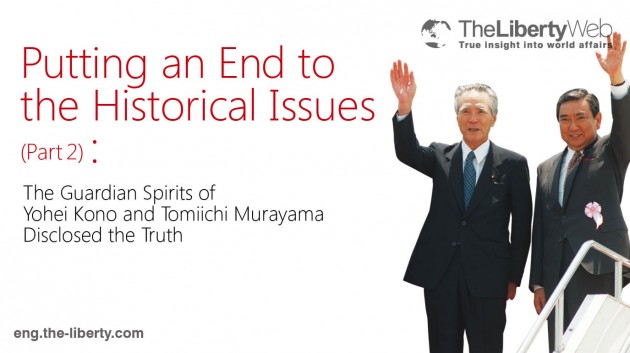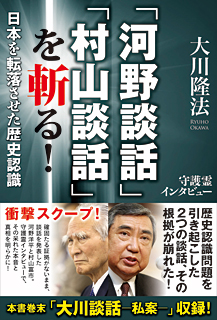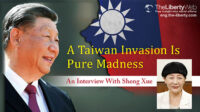Putting an End to the Historical Issues (Part 2):
The Guardian Spirits of Yohei Kono and Tomiichi Murayama Disclosed the Truth
What Are the Kono and the Murayama Statements?
In the Kono Statement of 1993, the Japanese government effectively admitted the involvement of Japanese military authorities in the war with the “forcible transportation” of comfort women, and Kono apologized for it. With regard to the recruiting of comfort women, the statement holds that “sometimes the authorities and others directly participated in it”.
In fact, a Japanese government investigation found not a scrap of evidence of “forcible transportation” by military authorities. The issuing of the statement was Chief Cabinet Secretary Yohei Kono’s “political decision”. He feared deterioration in Japanese-South Korean relations.
Due to the unfounded Kono Statement, a story about how the Japanese Army kidnapped women and turned them into “sex slaves” spread throughout the world. For example, a U.N. Human Rights Commission report referred to the content. South Korea is still playing this historical controversy as a diplomatic card to refrain from summit meetings.
In 1995, on the 50th anniversary of the war’s end, Prime Minister Tomiichi Murayama issued a statement apologizing for former acts of aggression. In the Murayama Statement, he received credit for having said, “During a certain period in the not-too-distant past, Japan, through its colonial rule and aggression, caused tremendous damage and suffering to the people of many countries, particularly those of Asia”. Japanese government officials still hold that view to this day.
Successive cabinets have adhered to the Murayama Statement, and even Prime Minister Shinzo Abe has yielded to criticism and agreed to it as well. Since Japan acknowledged itself as an aggressor nation, China and South Korea have adopted very aggressive diplomacy. Did you know that the Chinese Head of State, Xi Jinping, called Japan “a fascist state”?
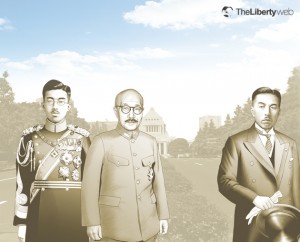
The Japanese leadership during the Greater East Asian War from the right: Emperor Showa, Tojo Hideki, Konoe Fumimaro
Kono and Murayama’s guardian spirits revealed the truth about how they composed the statements:
“There was no evidence to support the Kono Statement.”
“An Asahi newspaper reporter wrote the Murayama Statement.”
China and South Korea inevitably raise “the Rape of Nanking” and “the forced transportation of comfort women” as historical issues. Justifications for the attacks, in which both countries “confidently” bash Japan, were made public in the Kono and Murayama statements.
Prime Minister Shinzo Abe tried to issue the “Abe Statement” as a new way to perceive history. However, he instantly toned it down in the face of criticism and pressuring from the Japanese left-wing media, China, Korea, and the U.S. In addition to following the Murayama Statement, which he expressed his indication to revise, he also ended up inheriting the Kono Statement.
However, if Abe sets his sights on the revision of Article 9 of the Japanese Constitution and the creation of the national defense force, he need to perceive recent history in a new way, too. Therefore, Master Ryuho Okawa summoned the guardian spirits of Yohei Kono and Tomiichi Murayama on July 17th and asked them about their true, innermost feelings.
“I wanted to make compensations after the war.”
When asked if Kono had, in fact, acknowledged “the forcible transportation of comfort women by military authorities, he said, “The status of the people of the Korean peninsula gave them no right to make autonomous decisions, (…) It may well be, as conjectured, that compelling force was exercised.” Thus, Kono “confessed” that the Kono Statement was based on mere conjecture.
In addition, Kono revealed the shocking truth that he acknowledged the forcible transportation of comfort women because he wanted to make compensations after the war. Kono declared, “I wanted to pay reparations, but I needed grounds to do so. I wanted something to apologize for, and it didn’t really matter what it was”.
“The draft came from the mass media.”
Murayama’s guardian spirit disassociated himself from the Murayama Statement. “The draft came from the mass media,” he noted. “I didn’t write it. You can’t really expect me to answer a question about the content, can you? (…) He added, “Go, and ask the Asahi Shimbun.”
Kono was LDP President. He also served in the coalition government’s Murayama Cabinet as the Deputy Prime Minister and a Minister of Foreign Affairs, and was involved in the issuance of the Murayama Statement. According to Kono’s guardian spirit, at the time the left-wing mass media’s assertions had lost their legitimacy, which disappeared with the collapse of the Soviet Union, the LDP suffered with difficult situations such as the aftermath of the Recruit scandal and the collapse of the bubble economy. Then, a certain group in the mass media made a ‘secret agreement’.
“We agreed amongst ourselves that in order to ensure a left-wing predisposition remain, we needed to portray Japan somehow as a wrong country. This was the secret agreement.”
“We had to make it look as if we subscribed to a left-wing view of history. If we were willing to raise the issue as a just cause, we thought political power would return to the LDP.”
As official views of the government, these two statements not only fettered Japan’s diplomacy and national defense, but also spread a masochistic view of history and damaged Japanese pride. However, it’s now clear that their realities were based upon extremely shaky foundations.
Putting an End to the Historical Issues
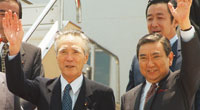
Foreign Minister Yohei Kono (right) masterminded the “Murayama Statement”. (Photo by Jiji Press)
Master Ryuho Okawa issued the aforementioned “Okawa Statement – My Proposal” in response to these spiritual messages, and declared the Kono and Murayama statements ‘retroactively invalid’.
Based upon these statements, the left-wing mass media, China, and South Korea have been possessed with a historical awareness of Japan as a ‘cruel aggressor’, and thus they have obstructed constitutional change in Japan simply because Japan could once more become a major military power. However, the security environment around Japan is steadily worsening, and the continued postponement of constitutional change and the strengthening of the national defense will only lead the country to ruin.
The Okawa Statement, which forever putting an end to the historical issues caused by the Kono and Murayama statements, will serve as a starting point for the rebirth of Japan as a country that will contribute to world peace and prosperity. It has now been seventy years since the war ended, and Japan must renounce its pattern of apologetic diplomacy. The time has come to restore Japan’s pride.

